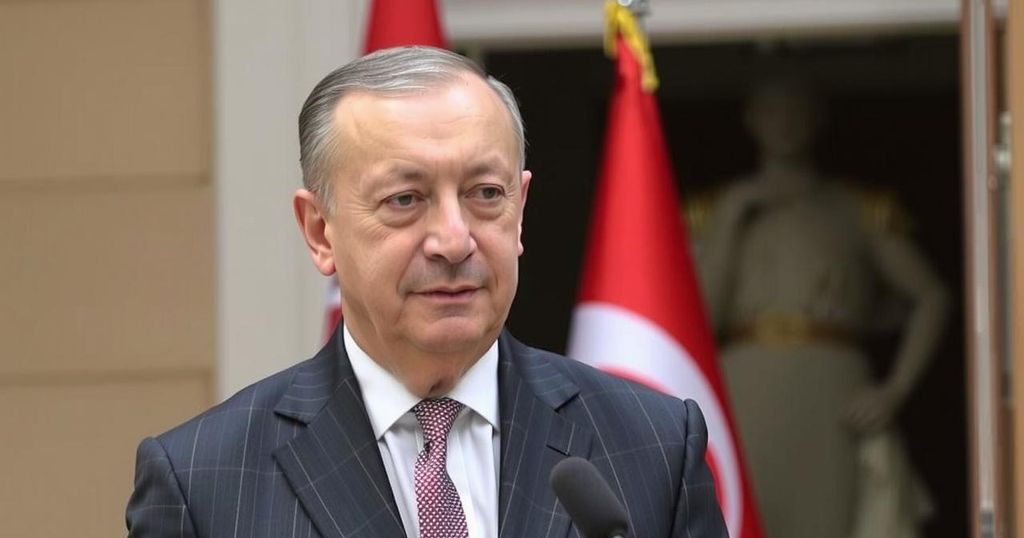Global news
ASIA, BASHAR AL - ASSAD, CONFLICT, ERDOGAN, EUROPE/ASIA, FIGHTER JETS, FREE SYRIAN ARMY, IBRAHIM KALIN, KALIN, ME, MEE, MIDDLE EAST, MILITARY OPERATIONS, NORTH AMERICA, PALESTINE, REFUGEE CRISIS, SISI, SYRIA, SYRIAN CONFLICT, SYRIAN NATIONAL ARMY, TA, TAHRIR AL - SHAM, TURKEY, UNITED STATES, US
Marcus Li
0 Comments
Erdogan’s Upcoming Visit to Cairo: Syria at the Forefront of Discussions
President Erdogan of Turkey is visiting Cairo to meet with President Sisi of Egypt, focusing on the political situation in Syria. Their discussions follow the recent rise of a Syrian transitional government after the ousting of Assad. The meeting is significant for Turkey’s regional influence and Egypt’s diplomatic role amid evolving Middle Eastern alliances.
President Recep Tayyip Erdogan of Turkey is scheduled to visit Cairo for discussions with Egyptian President Abdel Fattah el-Sisi, primarily focusing on the political situation in Syria. This meeting takes place within the context of a developing nations summit, the D-8, on December 19 in Egypt’s capital. Egyptian officials have expressed the need for Erdogan’s visit as they seek to address their concerns regarding Syria’s rising transitional government established after the removal of Bashar al-Assad’s regime.
Erdogan’s influence in the region has expanded following the ousting of the Assad government, particularly due to his historical support for Syrian rebels. Recent intelligence activities by Turkey’s National Intelligence Organisation, led by Ibrahim Kalin, have further solidified Turkish ties to the rebel factions within Syria. Kalin was reportedly filmed in Damascus, interacting with military leaders of the Hay’at Tahrir al-Sham (HTS), a group characterized by many nations, including Turkey, as a terror organization. Despite this designation, HTS representatives have engaged with ambassadors from several Arab nations, assuaging fears by promising an inclusive governance structure free from terrorist affiliations.
While Turkey continues to foster connections with Syrian rebel groups, neighboring Arab states, including Egypt, Jordan, and Saudi Arabia, have expressed anxiety over the implications of HTS’s ascent to power. This situation has led to a nuanced diplomatic maneuvering, with Egypt attempting to mediate between Turkey and Iran at the upcoming summit. The overarching concern remains whether the ongoing diplomatic relations can overcome historical animosities, particularly given the previous opposition between Erdogan and Sisi during the Arab Spring era and the Libyan conflict.
As Turkey aspires for stability in Syria to facilitate the return of approximately three million refugees and to engage in reconstruction efforts, discussions between Erdogan and Sisi are expected to encompass both political influence in Syria and potential contributions to its reconstruction, projected to cost $400 billion according to UN estimates. The results of this meeting may serve as a litmus test for future Arab and Turkish interactions in a transitioning post-Assad political landscape.
Ultimately, the Erdogan-Sisi dialogue may signify a pivotal step in reshaping Middle Eastern allegiances and approaches toward the Syrian crisis.
The diplomatic relationship between Turkey and Egypt has been complex and fraught with tension since the political upheavals of the Arab Spring. Erdogan’s backing of the Muslim Brotherhood clashed with Sisi’s military-led government following the coup in Egypt. Syria’s ongoing civil conflict, particularly the power dynamics following the toppling of President Bashar al-Assad, has shifted regional alignments, necessitating new negotiations and alliances among these nations. The recent actions and meetings involving HTS and emerging transitional governments add another layer of complexity, as regional powers grapple with the evolving political landscape and its implications for their national security and foreign policy interests.
In conclusion, President Erdogan’s upcoming visit to Cairo represents a significant moment in Middle Eastern diplomacy, as it highlights the shifting alliances within the region. Discussions primarily centered around Syria will reflect not only Turkey’s aspirations for influence in Syria’s post-war governance but also Egypt’s role as a mediator. The dynamics of this meeting will be closely monitored, as they could set a precedent for future relationships among Turkey, Egypt, and other regional powers navigating the implications of the Assad government’s fall.
Original Source: www.middleeasteye.net




Post Comment